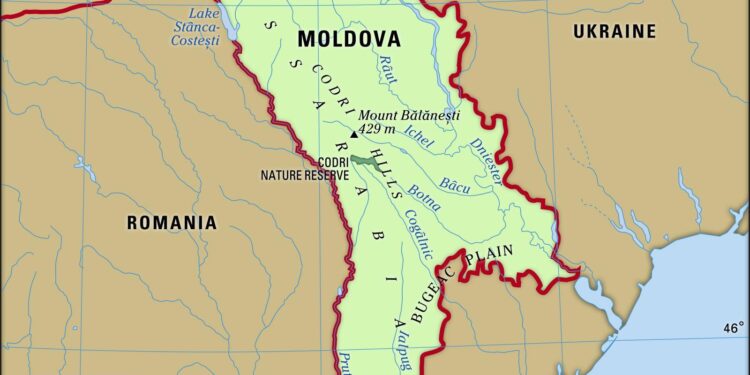Moldova has taken a decisive step in redefining its geopolitical future, delivering a resounding “yes” to closer integration with Europe while firmly rejecting Russia’s sphere of influence. In a landmark moment that underscores deepening divides in Eastern Europe, the country’s recent political and social shifts signal a clear pivot toward the West amid ongoing regional tensions. This article explores the factors driving Moldova’s choice, its implications for the country’s democracy and economy, and the broader ramifications for European security.
Moldova Embraces European Integration as Public Opinion Shifts Dramatically
In a historic shift, public sentiment in Moldova has decisively turned toward European integration, marking a pivotal moment in the country’s geopolitical orientation. Recent polls reveal a sharp increase in support for joining the European Union, driven by aspirations for economic growth, political stability, and closer ties with Western democracies. This transformation reflects widespread dissatisfaction with the influence of Russia, which many Moldovans now associate with corruption and conflict. The government’s proactive approach to reform and alignment with EU standards has further galvanized public enthusiasm, signaling a collective desire to break away from past dependencies.
Key factors influencing this shift include:
- Youth engagement: Younger generations are increasingly vocal advocates for European values and opportunities.
- Economic prospects: The EU promises access to larger markets and investment, crucial for Moldova’s development.
- Security concerns: Rising tensions in the region have prompted citizens to seek the protection and solidarity offered by EU membership.
| Year | Support for EU Integration (%) | Support for Russia Ties (%) |
|---|---|---|
| 2018 | 42 | 53 |
| 2022 | 67 | 29 |
| 2024 | 75 | 18 |
Challenges Ahead for Moldova in Balancing Regional Security and Economic Stability
Moldova stands at a critical crossroads, where securing its national interests requires navigating a complex geopolitical landscape. The pursuit of deeper integration with the European Union has fueled hopes for modernization and economic growth, yet it also intensifies tensions with Russia, which remains a dominant regional power with vested stakes. Maintaining regional security involves addressing persistent challenges including the unresolved status of Transnistria, ongoing energy dependencies, and military pressure from nearby conflicts. These factors demand a delicate diplomatic approach, where Moldova must assert its sovereignty while managing potential friction on its eastern borders.
Economically, Moldova faces obstacles that threaten the country’s stability amid shifting alliances. The transition toward EU markets necessitates significant reforms, infrastructure investments, and social adjustments, all of which require time and sustained financial support. Meanwhile, deep-rooted economic ties with Russia persist, especially in terms of remittances and trade. Balancing these realities calls for strategic decisions that prioritize sustainable growth without alienating vital economic partners. Key challenges include:
- Reducing energy dependence: Diversifying energy sources to avoid vulnerabilities linked to Russian supply chains.
- Protecting economic sectors: Supporting agriculture and manufacturing while integrating with EU standards.
- Managing social impacts: Addressing potential job losses or inflation that could arise from transitional policies.
| Challenge | Impact | Potential Solution |
|---|---|---|
| Transnistria conflict | Security instability | Diplomatic engagement & EU mediation |
| Energy dependence | Economic vulnerability | Invest in renewables & alternative suppliers |
| Trade realignment | Market access challenges | Enhance export capabilities & standards |
Strategic Recommendations for Strengthening Moldova’s Ties with the European Union
To solidify Moldova’s pro-European trajectory, it is imperative to focus on deepening economic integration through targeted reforms that enhance transparency, reduce bureaucratic red tape, and attract foreign investment. Prioritizing the modernization of critical infrastructure-especially in transport and digital connectivity-will enable Moldova to better link with EU markets, fostering economic resilience and competitiveness. Furthermore, educational and cultural exchanges must be expanded to cultivate a shared European identity among younger generations, ensuring sustained public support for the pro-European stance.
Key strategic initiatives include:
- Judicial reforms: Strengthen the rule of law to build confidence for EU investors and partners.
- Energy diversification: Reduce dependency on Russian energy sources by integrating with EU networks.
- Anti-corruption measures: Implement robust frameworks to enhance governance and public trust.
- Small and medium-sized enterprise (SME) support: Facilitate access to EU funds and markets.
| Area | Priority | Impact |
|---|---|---|
| Judicial Independence | High | Restores investor confidence |
| Energy Security | Medium | Reduces geopolitical risks |
| Digital Infrastructure | High | Boosts competitiveness |
| Public Administration | Medium | Enhances service delivery |
The Conclusion
Moldova’s emphatic endorsement of European integration marks a pivotal moment in the country’s modern history, signaling a clear departure from its Soviet past and a decisive stance against Russian influence. As Chisinau moves closer to the European Union, the geopolitical landscape of Eastern Europe is poised for significant transformation. The coming months will be critical in determining how Moldova navigates the complex challenges ahead, balancing domestic aspirations with external pressures. What remains undeniable is Moldova’s resolute choice to align with Europe’s values and future-an outcome that reverberates far beyond its borders.
















